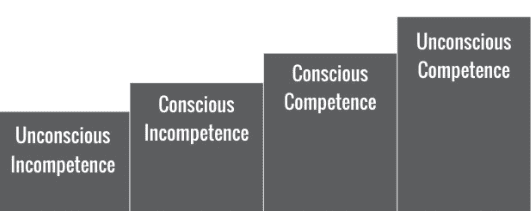 There are four levels of progression a person goes through in the development of competence. The pathway begins with a complete unawareness of how little a person knows and progresses to a complete unawareness of how much a person knows.
There are four levels of progression a person goes through in the development of competence. The pathway begins with a complete unawareness of how little a person knows and progresses to a complete unawareness of how much a person knows.
There is a dangerous cognitive phenomenon that can occur along this continuum known as the Dunning-Kruger effect. A person with this cognitive “bias” can be very dangerous and it can contribute to an erosion of their situational awareness.
 The competency progression model
The competency progression model
There are four steps in the progression of competency.
Step 1: Unconscious incompetence – being unaware of what you do not know.
Step 2: Conscious incompetence – being aware of how much you do not know.
Step 3: Conscious competence – being aware of how much you know.
Step 4: Unconscious competence – being unaware of how much you know.
The Dunning-Kruger Effect
 In 1999, two professors at Cornell University conducted a series of experiments and published their findings in the Journal of Personality and Social Psychology. What they uncovered is a cognitive bias where unskilled people suffer from the illusion of having superior skills and knowledge.
In 1999, two professors at Cornell University conducted a series of experiments and published their findings in the Journal of Personality and Social Psychology. What they uncovered is a cognitive bias where unskilled people suffer from the illusion of having superior skills and knowledge.
I have seen this first-hand in my Firefighter Safety: Mistakes & Best Practices class where I’ll ask a young firefighter (typically with less than 2 years experience) how comfortable they would be commanding a fire incident if they found themselves being the most senior person on the scene. Remarkably, I have had participants rate themselves as highly competent and highly confident. Then, I’ll ask them if they’ve ever commanded a structure fire before. Almost every one of them has not. I’ll ask if they’ve been trained in incident command. Most will acknowledge they have (often as an Internet-based training program). Remember, this person I am quizzing is the SENIOR member of the department on the scene. Clearly, these individuals are suffering from the “illusion of superiority” that David Dunning and Justin Kruger identified in their research.
The findings of the research revealed that incompetent people often:
1. Tend to overestimate their level of skill;
2. Fail to recognize the competent skills of their associates;
3. Fail to recognize the severity of the shortcomings;
4. Will recognize their own shortcomings after they have received training that exposes their deficiency.
Their findings were published in a paper titled: “Unskilled and Unaware of It: How Difficulties in Recognizing One’s Own Incompetence Lead to Inflated Self-Assessments”
The dangerous curse of incompetent and overconfident
 All responders start out unconsciously incompetent. They don’t know what they don’t know. This can be a blissful time as a new responder because the individual doesn’t realize how dangerous the work can be. The best-case scenario is an incompetent person would lack the confidence to perform highly dangerous work. Equally, it would be desirable if the incompetent lacked the confidence to assume command of an incident where a highly skilled and knowledgable commander is required.
All responders start out unconsciously incompetent. They don’t know what they don’t know. This can be a blissful time as a new responder because the individual doesn’t realize how dangerous the work can be. The best-case scenario is an incompetent person would lack the confidence to perform highly dangerous work. Equally, it would be desirable if the incompetent lacked the confidence to assume command of an incident where a highly skilled and knowledgable commander is required.
Unfortunately, an unconsciously incompetent person can way overestimate their own knowledge, skills, and abilities and put themselves in a position to inflict great personal harm or harm to others. This person would be known as lacking personal situational awareness.
The incompetent person can also fail to realize the knowledge, skills and abilities that are possessed by fellow responders who perform highly dangerous work with ease. When the incompetent fails to understand the knowledge level of their associates, they would be known as lacking team situational awareness.
Fortunately, as Dunning and Kruger discovered, the sooner an incompetent is exposed to the knowledge of their shortcomings (in the form of training), the quicker they will realize their deficiencies. Once the shortcomings are realized, the individual then progresses up the competency scale to conscious incompetence. They are now aware that what they do not know can be very dangerous. This should, in turn, lower their confidence and help reduce the possibility of them performing highly dangerous work without proper training.
Dr. Gasaway’s Advice
 While it is important to teach basic skills before advanced skills, I think it can also be very beneficial for newer members to be exposed to the complexities of the job early. Perhaps not teaching the complexities, but providing an introduction to them. My memory is summoned back to my hazardous materials training. The first level of the training was awareness – letting me in on the fact that Haz-Mat can be very dangerous and deadly. If I don’t have the right training and equipment, the best thing I can do is keep a safe distance and call in experts to deal with the problem. During my hazmat awareness training, no one tried to teach me the chemistry of hazardous materials. That would come later. The first class was intended to teach me just enough to have a healthy respect for hazmat.
While it is important to teach basic skills before advanced skills, I think it can also be very beneficial for newer members to be exposed to the complexities of the job early. Perhaps not teaching the complexities, but providing an introduction to them. My memory is summoned back to my hazardous materials training. The first level of the training was awareness – letting me in on the fact that Haz-Mat can be very dangerous and deadly. If I don’t have the right training and equipment, the best thing I can do is keep a safe distance and call in experts to deal with the problem. During my hazmat awareness training, no one tried to teach me the chemistry of hazardous materials. That would come later. The first class was intended to teach me just enough to have a healthy respect for hazmat.
I also remember how I felt after I graduated from my basic firefighter training program. I can say, with confidence, I suffered from the Dunning-Kruger cognitive bias. I was way too confident about what I knew. But I had a Firefighter 1 certificate, a wallet card, and even a patch to sew on my uniform shirt. I thought I knew what I needed to know to be a structural firefighter. I even once found myself establishing command at a complicated vehicle extrication where I had no business being in charge. Thankfully no one was hurt and the extrication was a success despite my best efforts to mess it up.
Perhaps the easiest person to help transition from unconscious incompetence to conscious incompetence is the new member, eager to learn and open-minded. Unfortunately, not everyone who suffers from the Dunning-Kruger effect is new. Sometimes the afflicted members have long-standing tenures in the department. Some, for a variety of reasons, never transitioned in their competency progression. Others transitioned, but then slid backward as they failed to keep up with changes in the field. These members may be the most dangerous of all because they may have both a huge blind spot and a huge ego. Competency cannot progress in the presence of denial.
Action Items
 1. Have a discussion among your members about the Dunning-Kruger effect. Be sure to be respectful of those members who may suffer from it. Do not automatically exclude yourself from consideration.
1. Have a discussion among your members about the Dunning-Kruger effect. Be sure to be respectful of those members who may suffer from it. Do not automatically exclude yourself from consideration.
2. Discuss strategies for how to develop the competencies in members who may be under-trained or under-experienced.
3. Strategize how to keep members who may be suffering from the illusion of superiority from being put into positions where their decisions can adversely impact safety.
_____________________________________________________

If you are interested in taking your understanding of situational awareness and high-risk decision making to a higher level, check out the Situational Awareness Matters Online Academy.
CLICK HERE for details, enrollment options and pricing.
__________________________________
Share your comments on this article in the “Leave a Reply” box below. If you want to send me incident pictures, videos or have an idea you’d like me to research and write about, contact me. I really enjoy getting feedback and supportive messages from fellow first responders. It gives me the energy to work harder for you.
Thanks,

Email: Support@RichGasaway.com
Phone: 612-548-4424
SAMatters Online Academy
Facebook Fan Page: www.facebook.com/SAMatters
Twitter: @SAMatters
LinkedIn: Rich Gasaway
Instagram: sa_matters
YouTube: SAMattersTV
iTunes: SAMatters Radio
iHeart Radio: SAMatters Radio

Chief,
Good article, great insight for Fire Chiefs, and officers as well as FFs. The hardest thing is getting folks to the awareness step as you stated. That for some of us has to be done over time, it seems upsets our equilibrium to do it too fast. I think one point that sometimes gets overlooked, is we all are all four of these at some point, on something…a “good” Paramedic in not at one point on all subjects related to EMS, and a “good” Chief is not at one point on all things, we just hope it isn’t at unconsciously incompetent on anything important, or at least something that will get people hurt or worse.
Happy New Year!
John,
Thanks for sharing your input. I really appreciate it. The best of the New Year to you as well, my friend. Here’s hoping our paths cross in 2014.
Rich
Rich, thanks again for the insight.
We recently experienced a fire in which “everything didn’t go right.” The firefighters were basically flushed out of the front door and we’re forced into a re-group. Unfortunately, they were unaware of a big “inflow” of fresh air to the fire.
The funny thing is that at the PIA these two (young) firefighters testified to the fact that “there had never been a fire that hot in years for our department.” lol. Now, as you can imagine, they are in the presence of many, many 20 year plus fire officers and firefighters. They didn’t even want to acknowledge their obvious mistakes, they just jumped over “all that” to get imply that we didn’t have any right to point out the opportunities for success because…well…we had never seen a fire like that…take off like that.
Poor kids. I was actually scared for them. I am however proud of my counterpart who had the situational awareness (and balls) to implement the evacuation tone and procedure.
Great read, and keep up the good work. It’s actually saving lives!
Brian Ritter
Wylie, Texas
Brian,
Thank you for sharing your feedback. I appreciate it very much. Your participation in the discussion ads value for the readers.
Rich